10 Best Multimeters for Electronic Technicians – Reviews & Guide 2023
-
- Last updated:
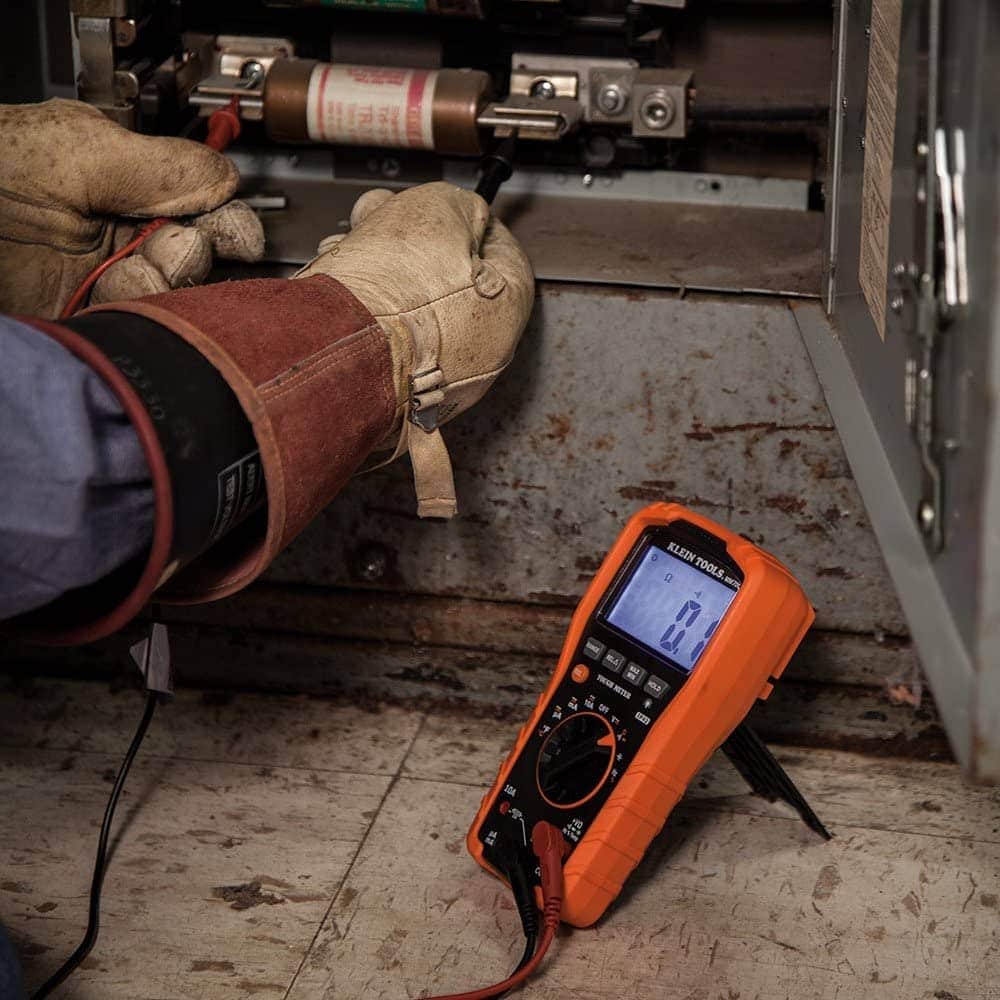
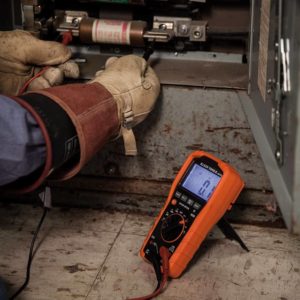
Multimeters are must-have tools for electronic technicians. These nifty devices can measure resistance, current, inductance, and a variety of other parameters. All of these measurements are necessary when you’re working with electronics. What’s more, having them all packed into one tool is very convenient.
However, when you’re putting all your money into one device, it is vital that it is high-quality and works well. An inaccurate multimeter can lead to all sorts of problems.
In our reviews below, we’ll discuss 10 of the best multimeters currently on the market for electronic technicians. We’ve also written a complete buyer’s guide, which should help you figure out what tools are best for your specific needs.
A Quick Comparison of Our Favorites in 2023
| Rating | Image | Product | Details | |
|---|---|---|---|---|
Best Overall
 |
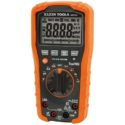 |
Klein Tools MM700 Multimeter |
|
CHECK PRICE |
Best Value
 |
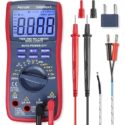 |
AstroAI WH5000A Digital Multimeter |
|
CHECK PRICE |
Premium Choice
 |
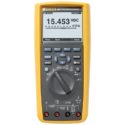 |
Fluke 287 True-RMS Logging Multimeter |
|
CHECK PRICE |
|
|
 |
Fluke 117 Electricians True RMS Multimeter |
|
CHECK PRICE |
|
|
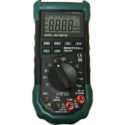 |
Tekpower Mastech MS8268 Digital Multimeter Meter |
|
CHECK PRICE |
The 10 Best Multimeters for Electronic Technicians
1. Klein Tools MM700 Multimeter – Best Overall

The Klein Tools MM700 is equipped with automatic ranging true root mean square (RMS) technology. This allows it to very accurately measure all sorts of things, including voltage, resistance, capacitance, frequency, duty-cycle, and a large variety of other points of measurement. It is a great all-in-one option because of this. It can measure everything an electronic technician might need. It is also built to withstand regular drops and daily wear-and-tear. It is quite durable, so you can expect it to last quite a long time.
It has a low impedance mode for identifying and eliminating ghost voltage, making it even more accurate than some other options on the market. Out of all those we reviewed, this is the best overall, mostly because of its high accuracy and durability. You really can’t get better than this one for the money.
The main downside of this multimeter is that it cannot measure over 10A. For some people, this is going to be a problem. If you need to measure over this amount, you should probably look elsewhere. For everyone else, though, this is the best multimeters for electronics you can purchase.
- Very accurate
- Durable
- Designed to withstand drops
- Eliminates ghost voltage
- Cannot measure over 10A
2. AstroAI WH5000A Digital Multimeter – Best Value
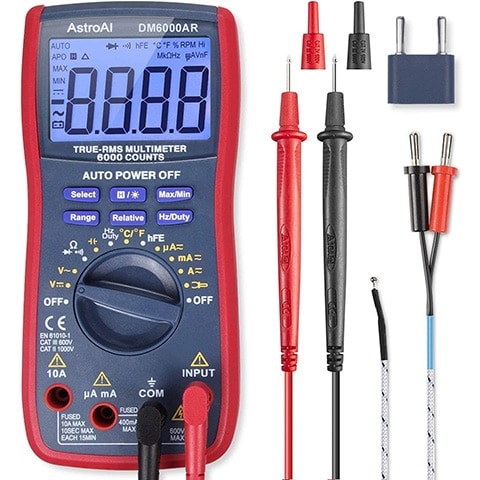
You may not be planning on using a multimeter very much, or you may be looking to spend as little money as possible. Either way, the AstroAI WH5000A is the best budget option currently on the market. It can do a wide-range of tests, including voltage, current, resistance, continuity, frequency, and everything else you may need to measure. Despite its low price, it has professional-level features, including measuring both AC and voltage. It is made for professionals but is at a much lower price than some other options on the market. In fact, we think it’s the best multimeter for electronic technicians for the money.
You’ll also like how easy it is to use. It has a large LCD backlit screen, auto shut-off, and a hanging magnet. The designers had customers in mind when designing this multimeter. It also has a 3-year warranty, which is always a nice plus.
One point of note: the frequency counter upper limit is actually 16 MHz, not 60 MHz, as the description states.
- Can take a variety of readings
- Inexpensive
- LCD backlit screen
- Auto shut-off
- Frequency counter upper limit is 16 MHz
3. Fluke 287 True-RMS Logging Multimeter – Premium Choice
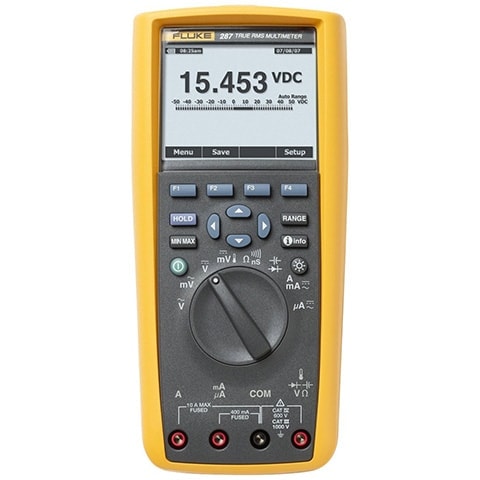
The Fluke 287 is extremely expensive. It costs much more than most of the competition. However, for this extra price, you do get quite a few added features. For example, it has auto and manual ranging. It can measure voltage, current, resistance, frequency, and a bunch of other electronic measurements. It provides very accurate readings on all of these points, even when measuring linear and nonlinear loads.
The data logging feature includes minimum, maximums, and averages. It even includes on-screen graphing, a real-time clock, and a data export to a computer. The LCD displays multiple measurements concurrently and can plot measurements on a single line to find irregularities over time. This can be extremely helpful in certain situations.
The major problem with this multimeter is that it is extremely expensive. It is much more than most of the other tools currently on the market. Because of this, it is likely out of the budget of many professionals on this list.
- Measures a wide variety of data
- Datalogging
- LCD displays multiple measurements
- Very accurate
- Expensive
4. Fluke 117 Electricians True RMS Multimeter
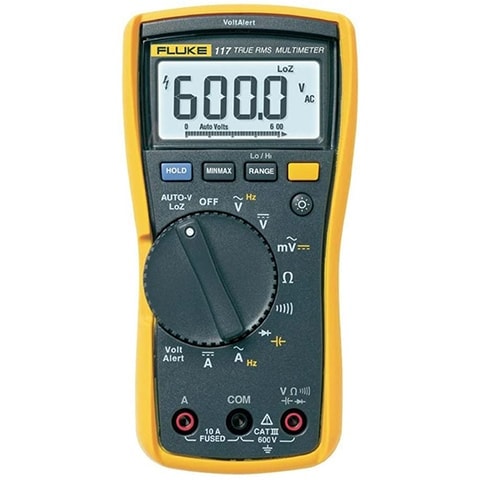
The Fluke 117 is a cheaper variation of our premium pick. It is most suitable for non-contact voltage detection, though it can also measure in a variety of other modes too. It has a low input impedance, so it won’t provide false readings due to ghost voltage. It also has a large, white LED backlight. It is very readable in dim areas, perfect for electricians who may not always be working in the best light conditions.
Furthermore, it has true RMS technology for very accurate readings. In fact, it is about as accurate as any of the others we’ve reviewed thus far. It has a long battery life of over 400 hours without using the backlight. The backlight will run the battery down faster. It has a 3-year warranty, which is about average for these tools.
There are very few negatives regarding this meter. It just doesn’t have some of the features that many of our top picks do, which is why it is rated so much lower than some other options. One of the few negatives we found was that the backlit screen is a bit harder to read than other options. The contrast between the screen and the numbers is not significant.
- Inexpensive
- RMS technology
- 400 hours
- Backlit screen is hard to read from some angles
5. Tekpower Mastech MS8268 Digital Multimeter Meter
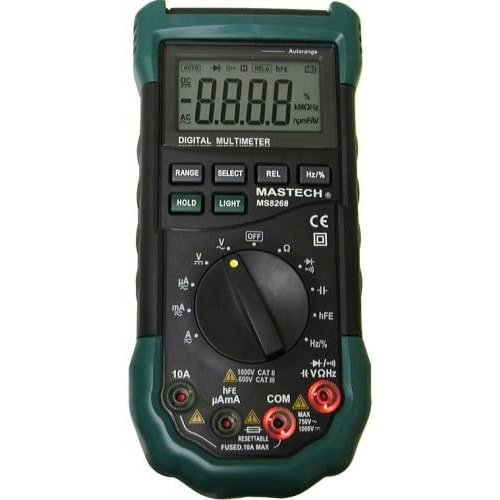
As an average multimeter, the Tekpower Mastech MS8268 is not terrible, but it isn’t great either. It has an LED and sound warning when incorrect banana jacks are plugged into the machine. This is a commonly overlooked feature, but it can help you get the correct reading if you tend to get the banana jacks mixed up. The auto and manual ranging also help you get the correct readings. These features make this multimeter very accurate. It is on par with the other multimeters we’ve reviewed this far.
This meter got rated so much lower for other reasons. Firstly, this meter is very slow. It takes it several seconds to get the reading, which can be difficult when you’re trying to hold the leads steady. Continuity testing is also slow, which results in other problems. It also crackles a lot, which means it likely has trouble making solid contact. Plus, the hold is manual. We don’t have three hands, and we doubt you do either.
- LED/sound warning when banana jacks are mixed up
- Accurate
- Slow
- Hold is manual
Click here to see the top clamp meters!
6. Crenova MS8233D Auto-Ranging Digital Multimeter
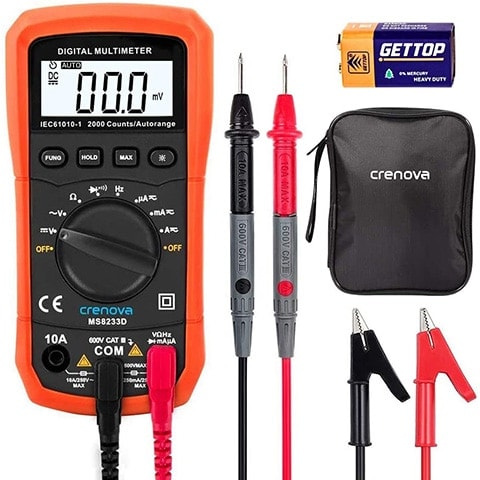
The Crenova MS8233D is a decent multimeter. It has a built-in double fuse, which protects it from overloading on all ranges. This is a great safety feature that also improves the longevity of the machine. It features an auto-ranging feature, but not a manual option. This may not be a big deal to some people, but it is a feature most other multimeters on the market have. The backlight display is decent and makes it easier to read in dim areas.
This multimeter runs on a 9V battery. One does come with the multimeter, but you will need to change it regularly.
While these factors are great, this multimeter is very slow. This is one reason why we rated it so low. It just isn’t worth the money based on how slow it reads. It can be difficult to read changes or intermittent signals because of this. You basically just have to get lucky! There is nothing to hold the leads, so when you put it up, you’ll need to use bread ties or something similar to keep it neat and orderly.
- Double fuse
- Backlit display
- Very slow
- Nothing to hold leads
7. Etekcity MSR-R500 Digital Multimeter
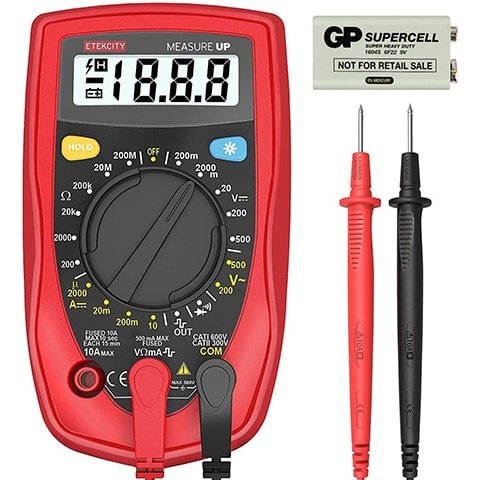
We wanted to like the Etekcity MSR-R500. However, there just went enough positives to outweigh all the negative features. It can test for all the usual metrics, including DC current, voltage, resistance, continuity, and more. This makes it pretty suitable for most professionals since you will be using a wide variety of different measurements on the job. The backlit display is easy to read and it has a built-in support stand, which is always a nifty feature.
The machine is protected from overloading as well and a rubber sleeve provides some protection against drops.
One of the big problems we ran into with this meter is that it cannot be used to test AC current. This is going to be a problem for professionals, who never know exactly what they’re going to be reading that day. You would need to purchase a different multimeter for AC currents, which just means you’ll have to spend more money.
The leads are also quite low quality – much lower than we were expecting at this price point. Accessing the battery is also incredibly difficult, which is absolutely unnecessary. They obviously did not think it through when designing this meter.
- Backlit display is easy to read
- Overload protection
- Low-quality leads
- Can only read DC currents
- Battery is difficult to change
8. KAIWEETS Digital Clamp Meter

With true RMS technology, the KAIWEETS Digital Clamp Meter is pretty accurate. It can accurately measure a variety of metrics, including currents, voltage, frequency, and more. It is also accurate for non-linear loads, though this is slowly becoming a more accurate feature. The low input impedance also prevents false readings due to ghost voltage, making this machine even more accurate.
However, the accuracy does not make up for all the negative features we discovered with this meter. This meter is a bit expensive for what it is. Your money is probably better spent elsewhere! You can likely find an equally good meter for much cheaper in our value pick.
This meter also has a difficult time measuring small currents, which can be a problem for professionals. This meter does not come with an alligator clip for the leads either. This is a simple feature, but it makes the machine much easier to use.
- Accurate
- Prevents ghost voltage
- Expensive
- Doesn’t measure small currents
- No alligator clip
9. Fluke 179/EDA2 Industrial Electronics Multimeter
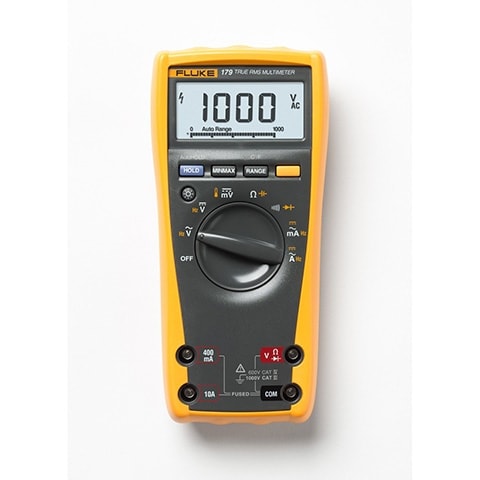
The Fluke 179/EDA2 comes with a variety of different accessories, which is its main selling point. It is advertised as being a “combo kit” for this reason. However, it really doesn’t come with many different accessories when compared to other, similar multimeters. Even though it is a “combo kit”, you really aren’t getting much extra, so don’t let the advertising fool you.
Despite this, it is quite expensive. In fact, it’s much more expensive than some of the other multimeters we’ve reviewed. This is its biggest negative. We just don’t believe you should put your money into this combo kit, it isn’t worth it.
Some of the accessories included are low-quality as well. The carrying case is obviously not the best, and we don’t expect that it’ll last very long. It also doesn’t have alligator clips, which is a must-have accessory that we would expect a “kit” to come with. All the accessories barely fit in the case as well, so you may have to end up buying a new one anyway.
- Comes with 6 accessories
- Expensive
- Low-quality carrying case
- Alligator clips not included
10. Amprobe 30XR-A Multimeter
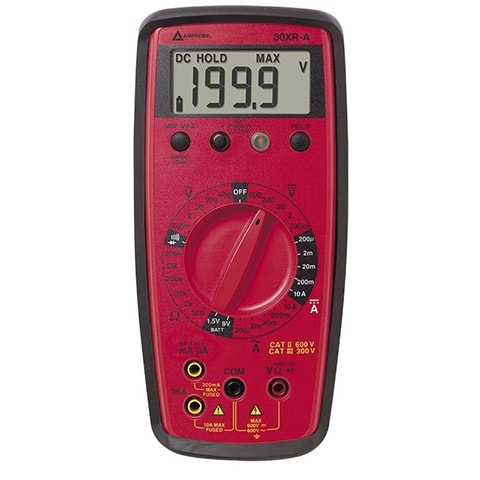
While the Amprobe 30XR-A Multimeter doesn’t necessarily look low-quality, there are many different features we just didn’t like (and we doubt you’d like them either). It takes a very long time to work. We’re talking about seconds of time, which can be very frustrating if you’re making multiple measurements at any one time. Any sort of accuracy is also difficult because of this. It is especially slow for capacitors. The continuity test position is also extremely slow.
The leads for this machine are not made out of silicone. This makes them stiff and somewhat hard to use. It isn’t that they’re impossible to use. But they are considerably more difficult and frustrating to use than we would have liked. This multimeter also doesn’t come with a carrying case, which is almost unheard of. This increases the chance that it’ll break and that you’ll lose pieces. It does come with an alligator clamp. However, where are you supposed to put it when you aren’t using it?
- Alligator clamp included
- No case
- Leads are inflexible
- Very slow
Buyer’s Guide – Choosing the Best Multimeters for Electronic Technicians
There is a lot that goes into a good multimeter, especially if you’re a professional! However, all of these machines look the same on the outside, and the descriptions can be a bit confusing and misleading. Figuring out which one you need can be difficult.
It isn’t just a matter of choosing the most expensive option or the “best” option. Which one is best for your needs depends on your particular situation.
What Are You Using It For?
Even as an electrical technician, you may be working on a variety of different projects. Perhaps you help people in their homes. Or, maybe you work for a larger company and just fix their stuff. What you commonly work on will play into what your professional job actually is. If you work on mostly AC current, a unit that can only measure DC isn’t going to be very helpful.
Furthermore, professionals probably need to think about factors like interference, vibration susceptibility, and resistance. When you’re a professional, getting your readings wrong can have serious consequences. Because of this, you need to ensure you have the most accurate meter available.
On the other hand, homeowners can likely get away with a cheaper model, since they’ll likely be calling in a professional for serious repairs, anyway. Plus, as a homeowner, you won’t be using the meter as much, so durability can be lower than those built for professionals.
Accuracy
Preferably, you want the most accurate multimeter you can get your hands on. Of course, it is a bit more complicated than just choosing a meter with the highest accuracy rating. Accuracy is dependent on a variety of factors. Multimeter readings change depending on the tolerance levels. Certain multimeters have different tolerance levels, so they can read different things accurately. For example, one with a low tolerance is going to be best for home use, while higher tolerance levels are best for industrial settings.
Once again, what you plan on doing with the meter matters.
Accuracy also has a direct relation to cost. More accurate meters usually have more features that help them stay accurate. These features are going to cost you a bit of extra money. If you have no budget, you can probably splurge on the best meter you can find. However, those on a budget are going to have to consider how much accuracy they really need. Not everyone needs the most accurate option.
True RMS Technology
True RMS handles alternating currents. Not everyone is going to need something that can read AC currents. However, many devices run on AC these days, so this is practically a must-have feature for most professionals. If you think that you may run into an alternating current, you need a multimeter that can measure it accurately.
Regularly multimeters have a hard time reading AC current because it tends to be sinusoidal and run in short pulses. They simply aren’t made to measure electric signals like this. Computers and similar electronics all run on AC, so we highly recommend purchasing a multimeter that has this feature built-in.
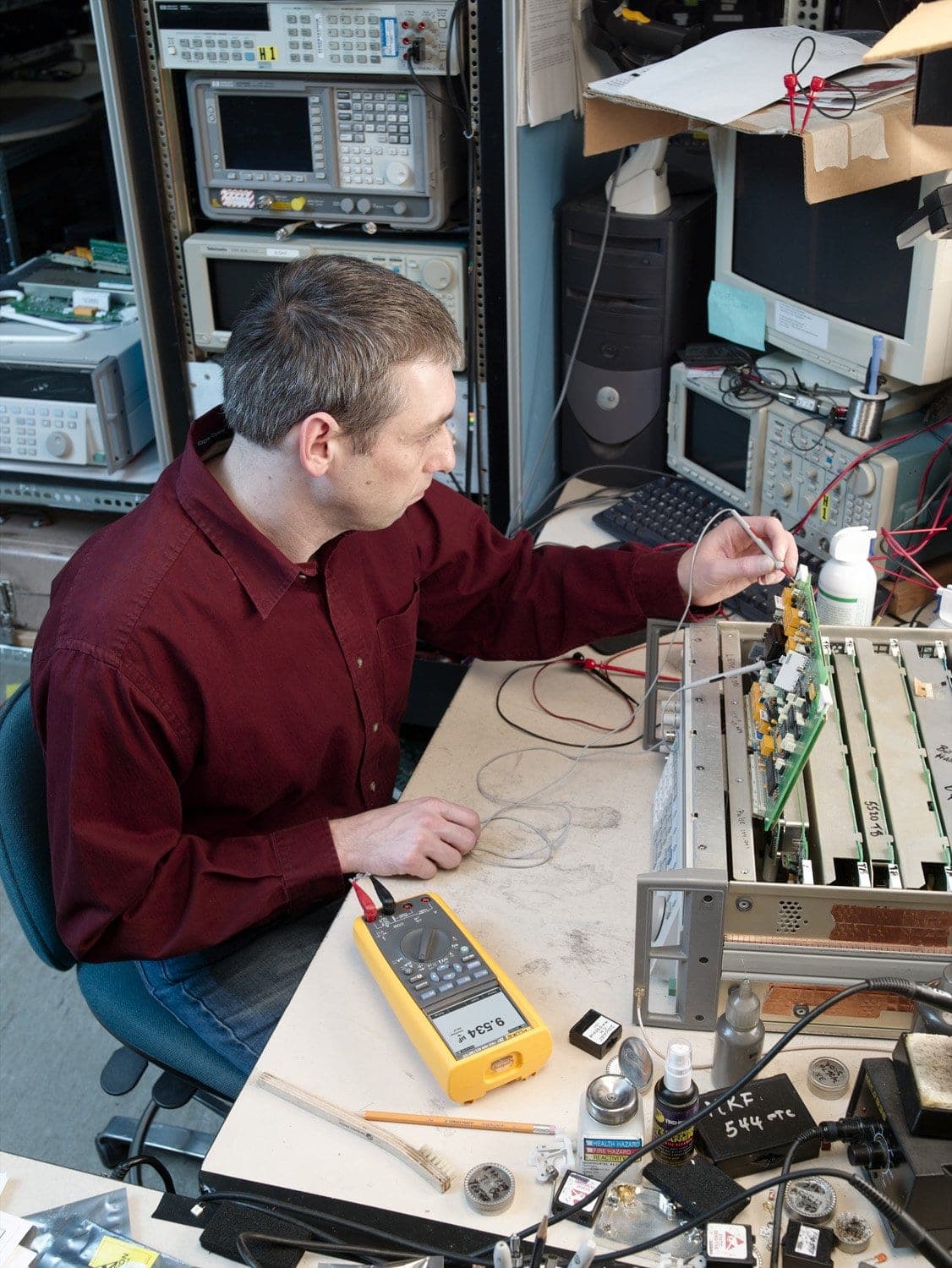
Auto-Ranging
This is a common feature that is a must-have. Most multimeters come with this feature just because it is so important. However, we did come into contact with a few multimeters that did not have this feature – which really surprised us. Because we consider this feature paramount to any professional, we highly recommend only buying a multimeter if it comes with this feature.
Auto-ranging allows the multimeter to automatically set the correct measurement range. This is not necessarily a must-have for homeowners, but it can save professionals a lot of time and frustration. You may have to pay a bit more for this feature, but we bet you’ll find it worth it. Many devices in our reviews section come with this feature, so you can just head up there for specific device recommendations.
Cost
Multimeters come in a wide range of costs. Some are incredibly expensive, while others are budget-friendly. Your budget depends on your specific situation, so we really recommend considering how much money you have to spend before you start shopping.
Typically, more expensive options are going to have better features and be more accurate. It really just depends, however. Don’t assume that a multimeter is better just because it costs more. We reviewed a number of meters that were unnecessarily expensive. You just don’t want to spend more money; you want to spend your money wisely.

Conclusion
We hope that this article helped you figure out exactly which multimeter is best for you. Our reviews above should help you figure out which multimeter is best for your situation. If you need help deciding, we recommend reading our buyer’s guide. It’ll help you tell the difference between the surprisingly similar options currently on the market.
The Klein Tools MM700 is the best overall option for most professionals. It is very accurate, durable, and measures practically everything we expect that you may need. It also isn’t terribly expensive, so it won’t burn a hole in your pocket either.
If you need to spend as little money as possible, we recommend the AstroAI WH5000A. It is decently accurate and has quite a few features, like LCD backlights, that we liked. It is best for those that are on a budget.
- See Also: 10 Best Budget Multimeters
Contents

